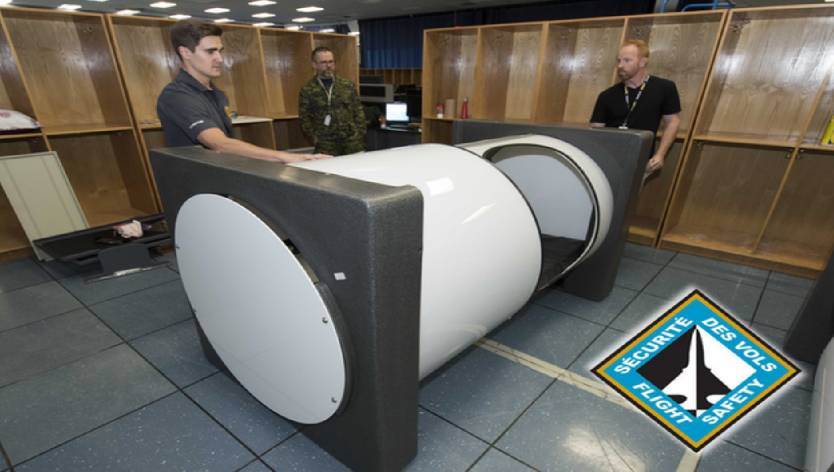Sleeping on the job might not seem like the best idea, but for members of 22 Wing North Bay it’s proven to be incredibly beneficial.
Many of the members at 22 Wing North Bay, are responsible for providing surveillance, identification, control and warning for the aerospace defence of Canada and North America at the Sector Air Operations Centre.
Each year more than 200,000 flights are identified on a 24/7 basis. Those responsible work on a four-day shift cycle with crews working two 12-hour days followed by two 12-hour nights followed by a four-day break between cycles.
Anyone who’s ever worked shifts understands the toll this takes, not only physically, but mentally.
Lucas DeMarco, Health Promotion Manager for the base, was hearing firsthand the effects of sleep deprivation and recognized the need for change.
“Our health promotion department had been working with people on their mental health, nutrition and other issues such as substance abuse and we would work with them on behaviour change strategies, but over time we kept seeing one of the root causes was fatigue,” said DeMarco. “We started to have some talks with the flight safety military department about what we could do about this and threw out the idea of sleep pause.”
A conversation among colleagues provided the idea for sleep pods. Sleep pods are special types of structures that allow individuals to nap. Further research by the team proved they might be on the right track. They found that the shift cycles without rests or naps could leave on-duty members in a cognitive state equivalent to that of someone with a blood alcohol concentration at or above 0.08%. But with a nap, members didn’t reach that level of poor cognition.
Major Kristofer M. Kaehler, who was part of the team at 22 Wing, believes the results of the Fatigue Risk Management System was instrumental in the concept for the sleep pods.
“We worked closely with the health promotion team and provided education to show how everything tied in,” said Kaehler. “Having the data and the health initiative tied in was so beneficial.”
Convincing senior management was another challenge altogether. The idea of staff taking a nap in the middle of a work day isn’t the most popular concept in the workplace.
“Having done our research and actually collecting some health matrix on the side we were able to conclusively prove that fatigue is not only a current issue, but it’s a solvable issue,” said Major Neeraj Pandey. “We were able to get interest from senior leadership immediately.
“I think it’s very similar to mental health,” Pandey said. “It’s recognizing that mental injury is just as important as a physical injury. It’s recognizing that fatigue is just as important as your tactical acumen. I think the mental health precedent benefitted us tremendously. People recognized it’s okay to shake the cobwebs and that a little cultural change may have drastic improvements on our operation.”
During the summer of 2017 the Wing Commander approved the purchase of three sleep pods and the health promotion team worked on educating staff of the benefits through presentations, brochures and posters. Understanding the dangers related to sleep deprivation was instrumental to getting staff onboard with the use of the sleep pods.
The pods were delivered the following summer and, by the fall, an area had been designated and the pods were ready for use, but encouraging people to sleep on the job was still a challenge.
“I needed leadership support to encourage their people to use them,” said DeMarco. “But probably more important was getting leadership to use them because you’re not going to go into one of these unless you see your boss go into it first.
“We really needed to make sure we had some champions of the cause at the higher ranks to make sure the lower ranks felt comfortable using it.”
The response has been so positive that two additional sleep pods have been purchased.
“There are those who’ve said it’s great to have that ability to take a power nap, but then there are others who have said this thing is saving me, it’s the thing that makes all the difference,” said DeMarco. “We’ve had those who’ve said this is protecting their mental health and helping them build resiliency.”
DeMarco says he sees no reason why sleep pods couldn’t be implemented on other bases.
“Every other paramilitary does this,” he said. “Firefighters have sleeping quarters and no one has ever questioned it.”
Both Pandey and Kaehler are on different bases now, but occasionally hear about the sleep pods in North Bay and take immense pride in the role they played for implementing such important change in the military. They hope other bases will see the benefit as well.
If you want to empower members under your command so that they can improve their health, contact the CAF Health Promotion program; their staff can help you identify barriers to health and wellness within your lines, and support you with initiatives that can contribute to meaningful change.


